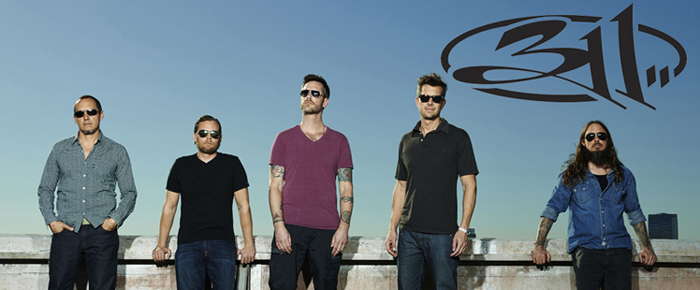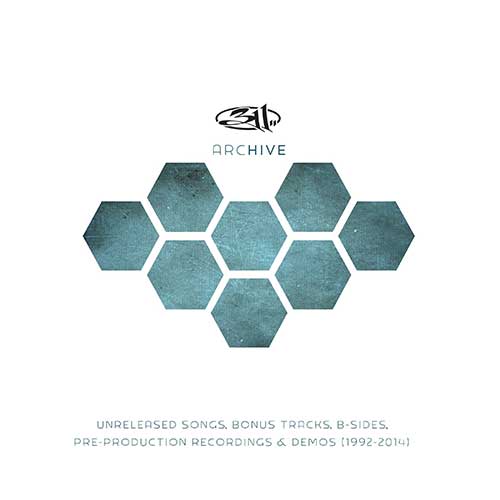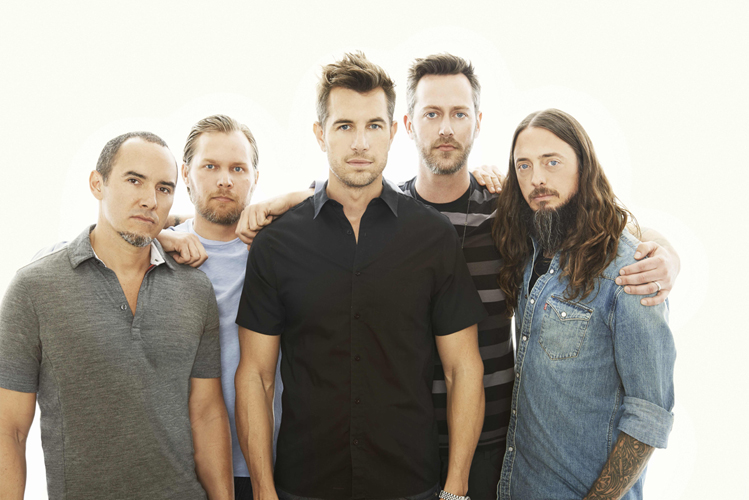
By Lisa Morgan
311, a band that forged its earliest foundations during the 80’s in two neighboring high schools in Omaha, Nebraska, could inarguably be considered one of the most intransigent, persevering, relentless, beloved and athletic rock bands touring today. Fans have learned that attending a 311 live show can easily turn into a marathon test of endurance. Known to play 70 or so songs over 5 hours in celebration of “311 Day” in Louisiana (an annual celebration held on March 11th), this band banks countless hours, tirelessly preparing to give their fans the best show they can. Their huge fan base that has supported them through near death and utter devastation, over decades of drastic technological and industry change, is a tribute to the fact that this band has never taken their success for granted.
 The rock, reggae, hip-hop, alt-metal, funk hybrid team consists of singer/guitarist Nick Hexum, singer S.A. Martinez, guitarist Tim Mahoney, drummer Chad Sexton and bassist P-Nut. Since 1993, the band has made their home in Southern California, releasing eleven studio albums (their third, self-titled album going triple platinum), a greatest hits album, three DVD’s and a box set. They have sold 9 million albums in the U.S. Nine of their albums have reached the Top 10 on Billboard’s Top 200 Sales Chart, and nine of their singles have reached the Top 10 on Billboard’s Alternative Rock Radio Chart. Last year, in celebration of their 25th Anniversary, they released the 311 ARCHIVE box-set, a special 4 CD collection including 81 tracks plus a 60 page book of rare photos and memorabilia.
The rock, reggae, hip-hop, alt-metal, funk hybrid team consists of singer/guitarist Nick Hexum, singer S.A. Martinez, guitarist Tim Mahoney, drummer Chad Sexton and bassist P-Nut. Since 1993, the band has made their home in Southern California, releasing eleven studio albums (their third, self-titled album going triple platinum), a greatest hits album, three DVD’s and a box set. They have sold 9 million albums in the U.S. Nine of their albums have reached the Top 10 on Billboard’s Top 200 Sales Chart, and nine of their singles have reached the Top 10 on Billboard’s Alternative Rock Radio Chart. Last year, in celebration of their 25th Anniversary, they released the 311 ARCHIVE box-set, a special 4 CD collection including 81 tracks plus a 60 page book of rare photos and memorabilia.
I had a rare and insightful opportunity to talk to 311’s Nick Hexum as the band prepared for their upcoming shows, including headlining this year’s Fifth Annual Rhythm, Wine and Brews Experience at the Empire Polo Fields in Indio March 5th.
CVW: “You guys have managed to stay together for over 25 years! That is a huge milestone for any relationship or even a business partnership. What do you attribute that to?”
Hexum: “I think we appreciate that we have stumbled onto something as a band that we do better together than we ever could apart. We realize we’ve got something cool here, and we take care of it. To be in a relationship this long, you have to be ok with not getting your way and to respect the group conscience/democracy. Of course there’s been disagreements, but as time goes on, it seems that we’re able to discuss things and come to a consensus fairly easily.”
“From a business perspective, we take a Midwestern approach to our work ethic. People in Nebraska don’t really expect things to come to them easily. There is no sense of entitlement. We just decided that we were going to work, work, work. We make sure we are prepared for our shows; I think we rehearse more than other bands. Fortunately, I love music so much I’m always writing and coming up with new things. In the past few years, I’ve spent a lot of time getting better on guitar. For example: I was always an idea guy, but I couldn’t really execute them … my hands couldn’t keep up with my ideas. We really put a lot of work into things like that.”
CVW: At what point did you guys feel like you had made it?
Hexum: “I think we had a lot of high-fives and celebration when we went on David Letterman and got invited to some really cool parties in New York. We had shot a video, and I remember all of us sitting at a celebration dinner. One of the guys in the band said, ‘Nick, you said this is what was going to happen, and now it is.’ I was the guy in the band who had said, ‘We gotta move to LA! We’ve got something here, trust me we can do it – why not us?’ So, that was kind of a, ‘Wow, we’ve done what we set out to do’ moment. There have been a lot of others – we have 311 day, have a sold out cruise to the Caribbean that we’ve done 4 times now – those are moments that make us super grateful.”
CVW: “How did you manage to get everyone to leave Nebraska and come out to LA?
Hexum: “I came out by myself at first, in 1988. I graduated from high school early (17), and was playing clubs on the Sunset Strip. Then Chad, our drummer, joined me for a few months. I worked at Guitar Center on Hollywood Blvd and had a pretty good network. We were really excited about the success we’d had just in Nebraska, and after being out in LA for a couple of years, I realized that these Sunset Strip metal-ers were really not the best people for me to be in a band with. My buddies from high school were the best musicians I knew, so I moved back and started 311” (Note: the name is code for law enforcement in Nebraska for indecent exposure/skinny dipping for which one of the members, former guitarist Jim Watson, was arrested for- at least, that is the most consistent story about the band’s name).
“For two years, we put out cassettes. Our second release actually made it to CD, which in 1991, was a huge deal. It was actually selling like hotcakes at the local record stores, outselling Michael Jackson and U2 at the time. We realized this wasn’t just a pie in the sky dream. People were really reacting to our music, and we used that kind of local success to show the record labels that we were outselling big artists. We used those independent albums as demos. Then, when we came out to LA/ Van Nuys, California, we already had a couple of albums and sales figures. We had momentum going, and fortunately got signed really quickly.” (Note: The band all moved in together in a place in Van Nuys and were seriously dipping into poverty level when their deal came through.)
CVW: Your shows are almost a fitness test for your fans. How do you guys pull that off?
Hexum: “Our show March 5th in Indio will be about 22 songs long, and we have some special things planned. I think staying in shape – having our bodies, our voices and our chops ready is a big part of it. We’ve been rehearsing for 311 Day. It’s kind of like when I did marathons before. They told me that the hard work is in the training, and the actual race day is like a victory lap. For me, I just remember the excitement of 311 Day carrying me through and not feeling tired until about an hour after.”
CVW: “There have been some incredible changes in the music industry due to drastic changes in technology since you guys started out. How do you view those changes and how have you managed to succeed in spite of them?”
Hexum: “My friend, Colin Hanks, did a documentary on Tower Records (All Things Must Pass: The Rise and Fall of Tower Records), and asked about my experience with them. There was such an excitement when new music would come out. You would stand outside waiting and there’d be a line, a listening party or an in-store event. Now that is all so obsolete, and there isn’t that same concentrated energy around music. Of course I love the convenience and that anybody can find anything. It is also the democratization of culture. I’m sure our business plan would have looked a lot different if we were just starting out today. Technology can be very separating. Ever since the time before record players, everyone would have to meet together in the town square to hear music. That collective human need of meeting together really provided something that I really miss. At the same time, our band is alive and well. Live music can never be completely imitated or pirated. It is still going to be a special experience. Fortunately for us, because we focus on the live show as the main point of what we do, I guess piracy hasn’t really affected us as it has other bands, because you can’t pirate a show.”
CVW: “That brings me to the question regarding streaming – where do you stand on the issue?”
Hexum: “I’ve always liked radio because that’s just free music for the people, and I’ve always said, ‘Get your songs in people’s heads and everything else will take care of itself.’ I think I feel the same way about streaming services. Of course they pay a tiny fraction of what once was considered fair for album/CD sales, but maybe it was over-inflated. Honestly, I just try to stay focused on the art side of it – making music from the heart that isn’t focused on the industry side of things. We just focus on being an artist and making sure we’re putting on good shows and having a good time doing it. I’ve never been one who’s refused to participate (with streaming). What I will say is this – one upside to streaming is that it rewards good music; the more times people listen to it, the more artists get paid. Before you could get tricked into buying a CD or album that you really didn’t like – rewarding good marketing, and hype. Now it really comes down to quality and whatever people listen to over and over. That’s where the revenue goes.”
CVW: “Since your initial success was helped greatly by radio play, do you still consider what mainstream radio stations will play when you’re writing and making new music?”
Hexum: “I think I’ve always liked catchy hooks and had a pop-sensibility as do the other guys. If you just make a full spectrum of the music you like, part of that is going to be candidate for a single. We just try to make music from the heart, and when we’re done and have the album together, we’ll just pick one that might reach a broader audience. The truth is, it’s very much a crap shoot – nobody really knows what’s going to be a hit. In the EDM world it’s likely going to be the latest production that’s automatically a hit, but in the alternative world it’s based on luck basically. So we just keep doing our thing, and some records do better than others, but fortunately, we have such a direct relationship with our fan base that we’ll probably be fine no matter what.”
 CVW: Is there a new album in the works?”
CVW: Is there a new album in the works?”
Hexum: “Yes, we have a good collection of music. We thought about trying to cram and get it out this year, but then we realized we have got our hands full with upcoming shows, so we’re going to take our time. We have 10 or 11 songs that we’ve recorded that we’re really excited about – some innovative new elements to the music that are hard to describe, but I know our fans are going to love it.”
CVW: “You’ve branched off onto a new project, The Nick Hexum Quintet…”
Hexum: “Yes. It was a lot of fun for me. I did it when 311 were on a break. I didn’t have any anticipation of putting it out to the fans like, ‘Hey, I’m working on a funky jazzy record!’ I just did it; it was just pure, creative freedom. It was fun working with jazz cats. 311 comes from the garage band world and we have a lot of cool influences. But these guys, like my brother Zack, come from living in Brooklyn and playing in Jazz clubs, so I was really the novice in the room. I learned so much from them. I really worked on my guitar playing a lot to play those guitar solos and leads that you hear there. I don’t have any plans to do another record like that right now though. Although I did put out a bonus track the other week to people who sponsored me when I ran to the top of the Empire State Building to raise money for Multiple Myeloma Research Foundation. There are some things there that I may focus on again one day, but right now, the focus is on 311.”
CVW: “Do you have any advice for our local musicians who want to make it in the music business?”
Hexum: “I think that the most important thing is to work on a really good live show, and to put in your ten thousand hours of practicing. Then go out and perform a lot – basically anything from playing in the open air mall with your guitar case open for change to local clubs. The more time you put into it, the better. You’re going to need to be tenacious. You’re going to get told ‘No’ a lot. You’ll go through set-backs, and you’re just going to have to get back up to bat over and over again. Make a decision and probably not have a big backup plan. For me, I felt if I had a backup plan, I was going to use it. It was LA or bust – that’s what our sign said.”
CVW: “Talking about set-backs, you guys have had a few, including a fire, right?”
Hexum: “Yes, that was during our first year of touring. We barely escaped with our lives. I got burns on the front and back of my body…only my arms got second degree burns where the skin actually shriveled up. I ran my hands through my hair and it was just like ashes. It was crazy, but it was also a unifying thing. We realized we don’t need stuff; we just needed each other and the songs. We borrowed some money from a generous fan, bought a better RV that was safer. We only missed one show; that was the show scheduled the night of the fire. And there was also a tornado heading for us. Right after the fire, we said, ‘We just have to get to Omaha’ so we rented a car, drove through a tornado, and played the very next night on borrowed instruments. We barely missed a step.”
CVW: “You’ve done so much and worked with so many notable people in the industry – you even produced the soundtrack to Adam Sandler’s “50 First Dates”.
Hexum: “Yeah, I owe Adam for our last number one – it was his idea. He loved the song “Amber” and asked, ‘Can you guys cover it kind of in the style of The Cure?’ I said, ‘That’s a great idea’ he called me directly on that one; the idea for the love song did come directly from him.”
CVW: “You’ve really been able to accomplish a lot and work with some really great people who share your passion for music.”
Hexum: “We were just talking about this at band practice the other day. We are just so grateful to be able to do this for so many years. It’s really not about selling a bunch of units for one time – but the longevity…the amount of time we’ve been doing something that we love on our own terms.”
For more information on 311 go to their website at 311.com












































